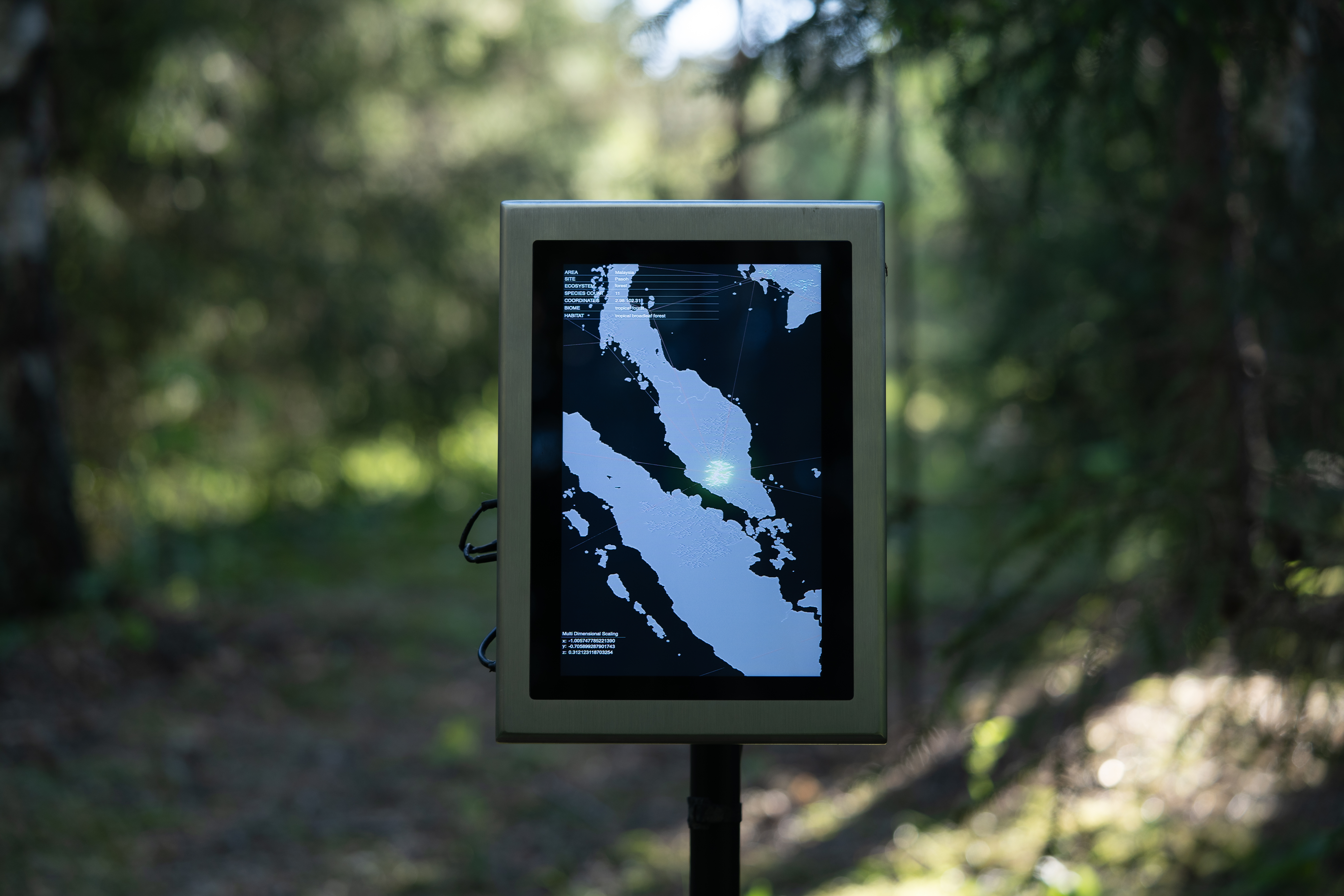FUNGI






The work investigates the intersection of art, science and technology, exploring the global underground ecosystem of mycorrhizal fungi by creating a metaphorical digital twin of the biological network, often referred to as the “Wood Wide Web”. The installation merges arbuscular mycorrhizal data sonification, 3D-printed ceramic sculptures and fungal knowledge to engage the audience in an artistic exploration of fungal communities and their symbiotic relationships with the vegetation while advocating for their protection. At the core of the installation, a virtual map forms the foundation for a physical experience of this ecosystem.
The soundscape, inspired by the polyphonic chant "Song For Gathering Mushrooms" sung by the women of the Aka people (an indigenous community, residing primarily in the Congo Basin of Central Africa), is reshaped by biogeographical data of the mycorrhizal network. Geotagged data points describing fungal ecosystems within the Maajaam landscape and globally, are mapped to sound parameters via an artificial neural network. The sound evolves as the network grows through a process of machine learning.
The FUNGI ORACLE, an AI trained on scientific literature from the mycorrhizal dataset and fine-tuned with quotes from renowned books like “Let’s Become Fungal”, “Entangled Life” and “Ways of Being”, synthesizes textual teachings about the mycorrhizal ecosystem, illuminating how symbiotic ideologies and insights from the non-human world can inspire human society.
3D-printed ceramic sculptures, crafted using images of mycorrhizal fungi extracted from root samples gathered in 12 different locations around the “Maajaam” territory in the Estonian Countryside embody the mycorrhizal networks and serve as resonating chambers for the sonified data. These elements merge into an immersive installation, capturing the diversity of the mycorrhizal fungal world and displaying its ecological significance.
CREDITS
FUNGI by Marco Barotti, was created during the residency “S+T+ARTS Project Grin” in collaboration with Cineca and Kilowatt, Bologna.
Mycorrhizal research: Maarja Öpik, Tanel Vahter
Atefe Farshadi: DNA extractions & root staining, microscopy
Martti Vasar: EcoBank excerpts
Arbuscular mycorrhizal fungi database “Ecobank” provided by the Institute of Ecology and Earth Sciences University of Tartu
Team
Software Programming: Marco Accardi, Alessandro Inguglia, Gabriele Scalici / Anecoica Studio
Design: Jonathan Wellmann
Text: Anna Anderegg, Sarah Möller
Technical design: Benjamin Maus, Alles Blinkt
Mycorrhizal research support: Spun Earth
Project Assistance: Azael Holtz, Andy Fofana
Fungi Oracle Voice: Malakoff Kowalski
AI & Machine Learning: Federico Visi, Neva Besker, Donatella Sforzini, Gabriele Fatigati
Ceramic 3D printing Expertise: Daniel Valencia Ferrá / Digital Craft
External Eye: Rebecca Pedrazzi
Motion Graphics Consultancy: Silvano Imboden, Daniele De Luca
Special thanx to WASP, Nicoletta Tranquillo, Kyle McDonald, Tobi Kiers, Nadia Soudzilovskaia, Nicole Hynson, Marcel Vanderheijden, Mattia Tuliozi, Silvia Girardello, Boris Acket, MariaChiara Liguori, Antonella Guidazzoli, Katharina Weikl, Saša Spačal, Lukas Esser, Misha Douglas MacLaren.
FUNGI is funded by S+T+ARTS Project Grin
Co-produced by Wild Bits at Maajaam in the framework of European Capital Of Culture Tartu 2024 and Schemerlicht Festival
Supported by Audio Ag, RME
Mycorrhizal research Supported By FUNFARM (Estonian Research Foundation grant no 1789) ( Maarja Öpik, Tanel Vahter, Atefe Farshadi) Center of excellence AgroCropFuture (Estonian Ministry of Education and Research, TK200U4) (Tanel Vahter, Martti Vasar)